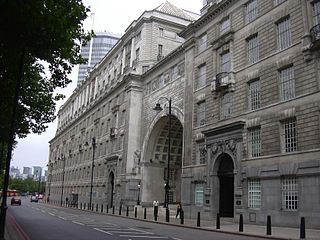Related Research Articles

Estoppel is a judicial device in common law legal systems whereby a court may prevent or "estop" a person from making assertions or from going back on his or her word; the person being sanctioned is "estopped". Estoppel may prevent someone from bringing a particular claim. Legal doctrines of estoppel are based in both common law and equity. It is also a concept in international law.
In common law countries such as the United Kingdom, the Philippines and New Zealand, passing off is a common law tort which can be used to enforce unregistered trade mark rights. The tort of passing off protects the goodwill of a trader from misrepresentation.

Specific performance is an equitable remedy in the law of contract, whereby a court issues an order requiring a party to perform a specific act, such as to complete performance of the contract. It is typically available in the sale of land law, but otherwise is not generally available if damages are an appropriate alternative. Specific performance is almost never available for contracts of personal service, although performance may also be ensured through the threat of proceedings for contempt of court.

English tort law concerns the compensation for harm to people's rights to health and safety, a clean environment, property, their economic interests, or their reputations. A "tort" is a wrong in civil, rather than criminal law, that usually requires a payment of money to make up for damage that is caused. Alongside contracts and unjust enrichment, tort law is usually seen as forming one of the three main pillars of the law of obligations.

WN Hillas & Co Ltd v Arcos Ltd [1932] UKHL 2 is a landmark House of Lords case on English contract law where the court first began to move away from a strict, literal interpretation of the terms of a contract, and instead interpreted it with a view to preserve the bargain. The Court ruled that judges may imply terms into a contract based on the past dealings of the parties rather than void the agreement.
In common law jurisdictions, a misrepresentation is an untrue or misleading statement of fact made during negotiations by one party to another, the statement then inducing that other party to enter into a contract. The misled party may normally rescind the contract, and sometimes may be awarded damages as well.
In English law, remoteness between a cause of action and the loss or damage sustained as a result is addressed through a set of rules in both tort and contract, which limit the amount of compensatory damages available for a wrong.

Beswick v Beswick[1967] UKHL 2, [1968] AC 58 was a landmark English contract law case on privity of contract and specific performance. The Lords, overruling the decision of Lord Denning in the Court of Appeal, ruled that a person who was not party to a contract had no independent standing to sue to enforce it, even if the contract was clearly intended for their benefit.

English contract law is the body of law that regulates legally binding agreements in England and Wales. With its roots in the lex mercatoria and the activism of the judiciary during the industrial revolution, it shares a heritage with countries across the Commonwealth, from membership in the European Union, continuing membership in Unidroit, and to a lesser extent the United States. Any agreement that is enforceable in court is a contract. A contract is a voluntary obligation, contrasting to the duty to not violate others rights in tort or unjust enrichment. English law places a high value on ensuring people have truly consented to the deals that bind them in court, so long as they comply with statutory and human rights.
The English law of unjust enrichment is part of the English law of obligations, along with the law of contract, tort, and trusts. The law of unjust enrichment deals with circumstances in which one person is required to make restitution of a benefit acquired at the expense of another in circumstances which are unjust.

Daulia Ltd v Four Millbank Nominees Ltd [1977] is an English contract law case, concerning unilateral contracts, and when embarking on the performance of an act for which an offer is open, at what point the offer may be withdrawn. In particular, Goff LJ observed that there would be a duty to not prevent full performance of terms in a unilateral offer, once performance had begun.
Privity is a doctrine in English contract law that covers the relationship between parties to a contract and other parties or agents. At its most basic level, the rule is that a contract can neither give rights to, nor impose obligations on, anyone who is not a party to the original agreement, i.e. a "third party". Historically, third parties could enforce the terms of a contract, as evidenced in Provender v Wood, but the law changed in a series of cases in the 19th and early 20th centuries, the most well known of which are Tweddle v Atkinson in 1861 and Dunlop Pneumatic Tyre v Selfridge and Co Ltd in 1915.

Proprietary estoppel is a legal claim, especially connected to English land law, which may arise in relation to rights to use the property of the owner, and may even be effective in connection with disputed transfers of ownership. Proprietary estoppel transfers rights if,

Mogul Steamship Co Ltd v McGregor, Gow & Co [1892] AC 25 is an English tort law case concerning the economic tort of conspiracy to injure. A product of its time, the courts adhered to a laissez faire doctrine allowing firms to form a cartel, which would now be seen as contrary to the Competition Act 1998.
Macaulay v Schroeder Music Publishing Co Ltd [1974] 1 WLR 1308 is an English contract law decision of the House of Lords relating to restraint of trade.
Certainty in English law sets out rules for how judges will interpret, sever or put contracts, trusts and other voluntary obligations into effect.

Attorney-General v Barker Bros Ltd [1976] 2 NZLR 495 is a cited New Zealand case regarding the legal concept of certainty regarding contract formation. It reinforces in NZ case law the English case of G Scammell & Nephew Ltd v Ouston [1941] AC 251.

Holman v Johnson (1775) 1 Cowp 341 is an English contract law case, concerning the principles behind illegal transactions.
Wells v Devani [2019] UKSC 4 is an English contract law case, concerning agreements to agree.
Times Travel (UK) Ltd v Pakistan International Airlines Corp [2021] UKSC 40 is an English contract law case, concerning economic duress.
References
Scammell and Nephew Ltd v Ouston